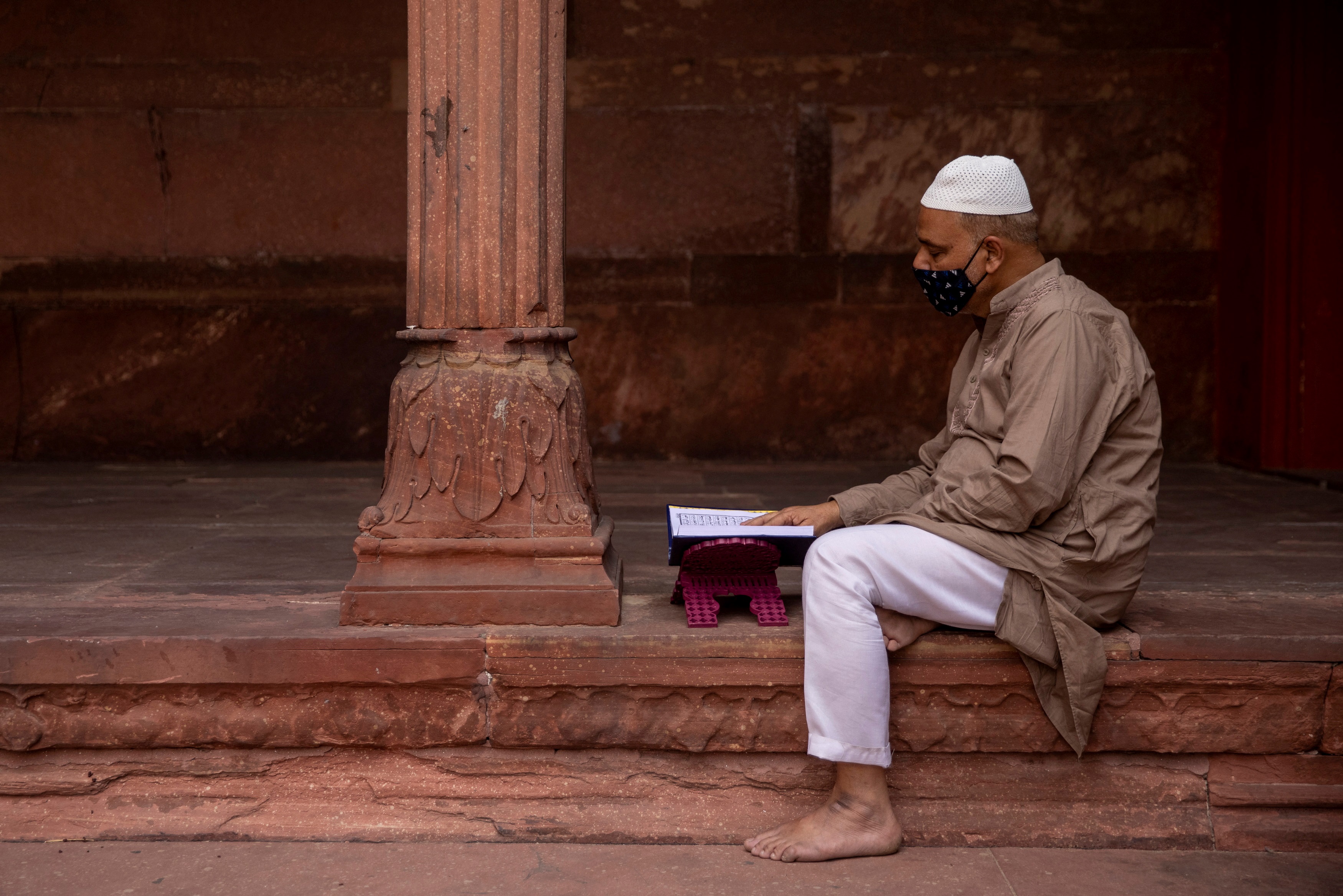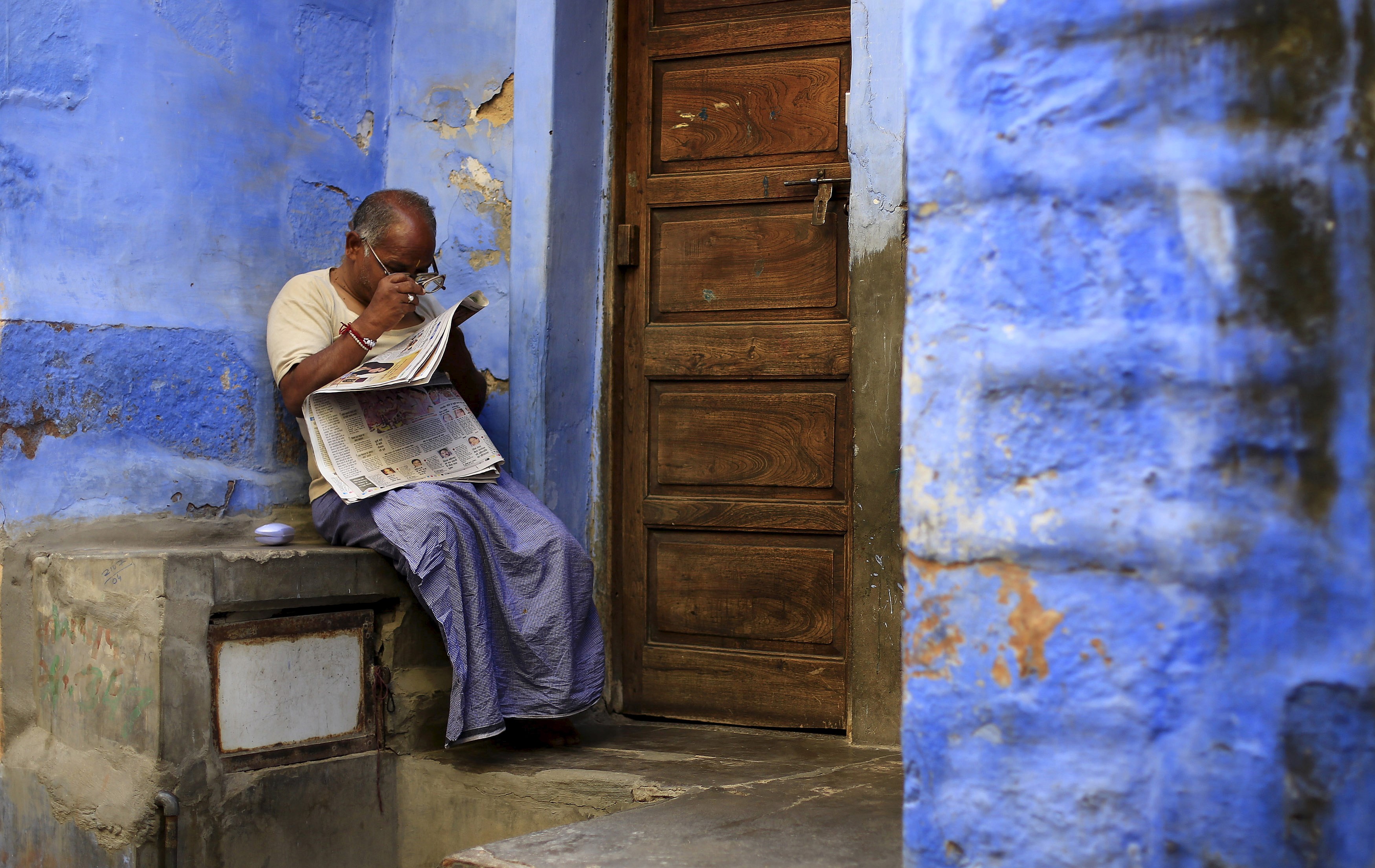ظلَّت العلاقات بين الغالبية الهندوسية والأقلية المسلمة في الهند هشّة متوترة منذ تقسيم الإمبراطورية البريطانية للبلاد عام 1947، إلا أن وصول حزب بهاراتيا جاناتا الذي ينتمي إليه رئيس الوزراء ناريندرا مودي إلى السلطة في عام 2014 أدى إلى تفاقم التوترات المجتمعية، خاصة أن عددًا من المنظمات القومية الهندوسية وبعض وسائل الإعلام صارت أكثر جرأة في ترويج آرائها المعادية للمسلمين، وهي ممارسة اتهمت حكومة رئيس الوزراء مودي بتشجيعها.
الهند في مؤشر حرية الصحافة
حسب تقريرها السنوي الأخير، بينّت منظمة "مراسلون بلا حدود"، أن الوضع في الهند تحوَّل من "إشكالي" إلى "خطير للغاية"؛ نتيجة سيطرة مودي ونفوذه على عدد من المنابر الإعلامية بما يُهدد تعددية الصحافة في البلاد.
التقرير الذي يضمّ 180 دولة، فإن مرتبة الهند هذا العام كانت 161، بينما كانت العام الماضي في المرتبة 150، حيث تراجعت 11 مرتبة لتسجل أدنى مستوى لها على الإطلاق بين 180 دولة.
ويمكن ملاحظة حجم تراجع الهند في مؤشر حرية الصحافة بمعرفة مرتبتها في عام 2013، أي قبل عشرة سنوات من الآن، وقبل وصول رئيس الوزراء ناريندرا مودي إلى منصبه، حيث احتلّت مرتبة الهند حينها 140 من أصل 180، ما يعني تراجع الهند 21 خطوة للخلف خلال عشرة سنوات في مؤشر حرية الصحافة.
منظمة "مراسلون بلا حدود"، أشارت في تقريرها، إلى أن: "العنف ضد الصحفيين ووسائل الإعلام الحزبية سياسيًا وتركيز ملكية وسائل الإعلام، تُظهر كلها أن حرية الصحافة في أزمة في "أكبر ديمقراطية في العالم".
ترويض الإعلام الهندي بدأ بصعود مودي إلى السلطة، إذ أُعيد تشكيل القيادات التحريرية لبعض المؤسسات الإخبارية الكبرى في الهند، وتحديدًا شبكات التلفزيون، واستبعد كبار المحررين غير المنتمين إلى النظرة القومية الهندوسية لحزب بهاراتيا جاناتا، وكذلك أُلغيت القنوات الجديدة.
ما وراء التحوّل في الإعلام الهندي
بعد شهر من توليه منصبه في صيف عام 2014 ، قال رئيس الوزراء ناريندرا مودي إن "ديمقراطية الهند لن تستمر إذا لم نتمكن من ضمان حرية الصحافة والتعبير"، وفي نفس السنة، أصدرت نقابة المحررين في الهند بيانا جاء فيه: "نظرا لتأخير إنشاء واجهة إعلامية في مكتب رئيس الوزراء، ولتقييد التواصل مع الوزراء والبيروقراطيين في المكاتب، والحد من تدفق المعلومات في الداخل والخارج، بات من الواضح أن الحكومة في أيامها الأولى تسير على طريق يتعارض مع معايير الخطاب الديمقراطي والمساءلة".
من الناحية التاريخية، يُنظر إلى الصحافة الهندية على أنها تقدمية إلى حدٍ ما، وهي التي انبثقت عن حركة إنهاء الاستعمار البريطاني، لكن الأمور تغيرت بشكل كبير في منتصف العقد الماضي، الذي تزامن مع وصول ناريندرا مودي إلى السلطة.
هذا التحوُّل في وسائل الإعلام الهندية سلط عليه الضوء الصحفي ديبايسش روي تشاودري، في مقالة كتبها لمجلة ذا تايم الأمريكية، أكد فيها أن ترويض الإعلام الهندي بدأ بصعود مودي إلى السلطة، إذ أُعيد تشكيل القيادات التحريرية لبعض المؤسسات الإخبارية الكبرى في الهند، وتحديدًا شبكات التلفزيون، واستبعد كبار المحررين غير المنتمين إلى النظرة القومية الهندوسية لحزب بهاراتيا جاناتا، وكذلك أُلغيت القنوات الجديدة.
وبالتالي، من الطبيعي لاحقا أن تُكتَم كافَّة الأصوات المزعجة والمخالفة للسلطة، بطرق ووسائل عدّة، منها: ما اعتمدته السلطات من عملية ترهيب ممنهجة بحق الصحفيين الذين ينقلون جانبا من الانتهاكات التي تستهدف الأقلية المسلمة في البلاد، إذ حظرت قنوات تمنح مساحة للمسلمين للتعبير عن القمع الذي يتعرضون له، ولاحقت الصحفيين المسلمين الذين يغطون انتهاكاتها، وسعت إلى تقييد حساباتهم على مواقع التواصل الاجتماعي، وأُغرقت القنوات التلفزيونية والصحف ومنصات التواصل الاجتماعي بخطاب الكراهية ضد المسلمين من دون أي رادع.
ولم تتوقف المسألة عند هذا الحد، إذ لم يتوان الحزب اليميني المتطرف الحاكم عن ملاحقة الصحفيين المسلمين، والنساء منهم تحديداً، لمجرد تأديتهم لعملهم.
كانت الصحافة تُلمح تارة وتصرّح تارةً أُخرى بأن المسلمين ينشرون الفيروس عمدا، وابتدعت بعض المحطّات التلفزيونية مصطلح "جهاد كورونا"، بمعنى نشر المرض ووصفتهم بأنهم "انتحاريون وقنبلتهم الفيروس".
وربما لا يوجد مثال على ما يحدث في الهند اليوم أفضل من "رنا أيوب"، الكاتبة الهندية والصحفية الاستقصائية، التي برزت في الصحافة العالمية وتصدَّرت أعمالها غلاف مجلة "تايم" الأميركية، كما أنها تكتب بانتظام أعمدة في صحيفة واشنطن بوست الأميركية. تسبَّب هذا العمل في تعرُّضها لسيل من الإساءات الرقمية، بما في ذلك تهديدات بنشر معلوماتها الشخصية على الإنترنت، وكذلك تهديدات بالقتل.
كما واجهت أيوب سنة 2021 سلسلة من التهم الجنائية، تتعلَّق إحداها بفيديو انتشر على نطاق واسع لرجل مُسِن يزعم أنه كان ضحية هجوم معادٍ للمسلمين شاركته رنا عبر تويتر رفقة صحفيين آخرين ونوَّاب برلمانيين، علاوة على ذلك، تواجه رنا تُهمًا منفصلة بالتهرُّب الضريبي، واختلاس أموال جمعتها من عملها الإغاثي أثناء الجائحة، وهي تهم تؤكد أيوب أنها باطلة.
وكونها صحافية ومسلمة وصوتا ناقدا للقومية الهندوسية التي تتبناها الحكومة، فإنها بذلك تمثِّل الكثير من الهويات التي لم تعُد الهند اليوم تحت حكم مودي تتسامح معها، بل وتسعى لقمع أي معارضة من خلال نشر قوات الشرطة والأمن لقمع الاحتجاجات، أو من خلال اعتقال وتخويف الصحفيين الذين يسعون لتغطية أخبار تضع مودي أو حزبه في دائرة النقد.
خطاب الكراهية.. كورونا وأشياء أخرى
في عام 2017، بدأت صحيفة هندوستان تايمز، وهي صحيفة هندية بارزة، في تعقّب جرائم الكراهية ضد المسلمين، لكن هذه المبادرة سرعان ما توقفت بسبب ضغوط الحكومة وفق ما أشارت إليه التقارير الإخبارية، استقال رئيس تحرير الصحيفة بوبي غوش، الذي قاد المبادرة، بعد فترة وجيزة، ورفض التعليق.
وبعد عام 2017، توقّف مكتب الجريمة في الهند عن جمع البيانات حول جرائم الكراهية، ما أدى إلى صعوبة الوصول إلى إحصاءات رسمية واضحة لجرائم الكراهية.
ورغم ذلك، يمكن ملاحظة ملامح هذا الخطاب ضد الأقلية المسلمة وشدّته من خلال مراجعة بعض الوقائع أبرزها: كيف انبرت وسائل الإعلام الهندوسية إلى انتقاد المسلمين الهنود باعتبار أنهم السبب في انتشار فيروس كورونا، حيث كانت الصحافة تُلمح تارة وتصرّح تارةً أُخرى بأن المسلمين ينشرون الفيروس عمدا، وابتدعت بعض المحطّات التلفزيونية مصطلح "جهاد كورونا"، بمعنى نشر المرض ووصفتهم بأنهم "انتحاريون وقنبلتهم الفيروس".

نشرت صحيفة ذا هندو رسم كاريكاتير يظهر فيروس كورونا في لباس المسلمين التقليدي وهو يحمل بندقية ويوجهها نحو كوكب الأرض.
وبدأت الأخبار الكاذبة التي تستهدف المسلمين بالانتشار، بما في ذلك مقاطع مصورة يُزعم أنها تظهر أعضاء من جماعة "تبليغ الدعوة" يبصقون على السلطات، وثبت بسرعة أن المقاطع مزيفة. وذكر السكرتير المشترك لوزارة الصحة الهندية لاف أغاروال، مرارا وتكرارا الجماعة بالاسم في جلسات إفادة يومية، كما أنه قال في إحدى المرات إن عدد الإصابات بالفيروس قد تضاعف في 4 أيام فقط، وكان يمكن أن يكون أبطأ "لو لم تنشأ حالات إضافية بسبب اجتماع جماعة التبليغ".
خلال الفترة نفسها، نشرت صحيفة ذا هندو رسم كاريكاتير يظهر فيروس كورونا في لباس المسلمين التقليدي وهو يحمل بندقية ويوجهها نحو كوكب الأرض. بعد انتقادات كبيرة واجهها الكاريكاتور على شبكة الإنترنت، حذفته الصحيفة، ثم أعادت نشره متخلية عن لباس المسلمين التقليدي فيه.
ثمة تهمة أخرى لاحقت المسلمين الهنود بعد الفيضانات المُدمرة التي ضربت ولاية "آسام" عام2022، وأسفرت عن مقتل 192 شخصًا، حيث زعم بعض مستخدمي مواقع التواصل الاجتماعي دون دليل، أن مجموعة من المسلمين هم من غمروا مدينة سيلشار ذات الأغلبية الهندوسية بالمياه بعد تدمير دفاعاتها ضد الفيضانات.
ورغم عدم وجود أدلة تُظهِر تورطه في هدم أي سدود، إلا أن عامل البناء الهندي المسلم نذير حسين قضى عشرين يوما خلف القضبان قبل إطلاق سراحه بكفالة مالية.
حرية الإنترنت
للسنة الخامسة على التوالي جاءت الهند في مقدمة دول العالم من حيث قطع الإنترنت، حسب تقرير لمنظمة "أكسيس ناو" الأمريكية التي تدرس الرقابة على الإنترنت عبر العالم.
وقال تقرير المنظمة إن الإنترنت قطع 187 مرَّة في دول العالم خلال سنة 2022، منها 84 مرة في الهند وحدها وهي أعلى نسبة في العالم، وكانت أغلب حالات القطع في إقليمي جامو وكشمير ذات الأغلبية المسلمة؛ بسبب العنف وعدم الاستقرار السياسي، وذلك رغم قرار المحكمة الهندية العليا عام 2020 بأن التمتع بالإنترنت حق أساسي للمواطن الهندي، وأن قطع الإنترنت لا يمكن أن يكون بلا نهاية، وأن كل قرار بقطع الإنترنت لا بد أن ينشر متضمنا سبب القطع.
لم تسلم بعض المنصات الأمريكية الشهيرة مثل يوتيوب وتويتر من المضايقات التي تتعرض لها الحريات في الهند، حيث استغلت حكومة مودي قانون الطوارئ الشهر الماضي لمنع عرض فيلم وثائقي أنجزته هيئة الإذاعة البريطانية بي بي سي بعنوان "سؤال مودي" (The Modi Question).
يسلّط الفيلم الضوء على ما جرى في ولاية غوجارات الهندية التي عانت من دوامة عنف شديدة عام 2002 خلال قيادة مودي لحكومة الولاية، قُتل فيها أكثر من ألف شخص على مدى أسابيع، جلهم من المسلمين.
وكانت الحكومة الهندية قد وصفت الفيلم بأنه "دعاية معادية وهراء مناهض للهند، ويقوض سيادة الهند وسلامتها، ولديه قدرة التأثير سلبًا في العلاقات الودية مع الدول الأجنبية والنظام العام داخل البلاد"، على حد تعبيرها، كما ندد كبير المستشارين في وزارة الإعلام والإذاعة الحكومية الهندية، كانشان غوبتا، بالفيلم وصفا إياه بـ"قمامة معادية للهند". وقال إن تويتر ويوتيوب تلقتا أوامر بحظر روابط الفيلم، و"امتثلتا للتوجيهات".
المتحدث باسم "يوتيوب"، جاك مالون، قال لموقع "ذي إنترسبت": إن روابط الفيلم الوثائقي حذفت من المنصة بسبب مطالب من بي بي سي تتعلق بحقوق الطبع والنشر، لكنه رفض التعليق على الطلبات التي قدمتها الحكومة الهندية، أما إيلون ماسك، الرئيس التنفيذي لـتويتر، حاول تبرير الموقف الذي اتخذته إزاء الفيلم، إذ غرّد: "لا يمكنني إصلاح كل ما يتعلق بتويتر، في أنحاء العالم كافة، بين عشية وضحاها، وسط انهماكي بتشغيل تسلا وسبيس إكس وغيرهما".
ويُبيِّن المقال أن امتثال تويتر للمطالبات الحكومية الهندية كان بنسبة 20 في المئة قبل تولي ماسك زمام الأمور، لكنه حين استحوذ على الشركة، سرح نحو 90 في المائة من موظفيها في الهند، البالغ عددهم نحو 200 موظف، وفقاً لـذي إنترسبت، ويبدو حاليًا أنه يتجه أكثر فأكثر نحو الخضوع للحكومة الهندية في ظل الضغط المنتظم الذي تمارسه على الحريات.


















![Palestinian journalists attempt to connect to the internet using their phones in Rafah on the southern Gaza Strip. [Said Khatib/AFP]](/sites/default/files/ajr/2025/34962UB-highres-1705225575%20Large.jpeg)





















